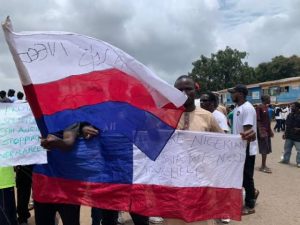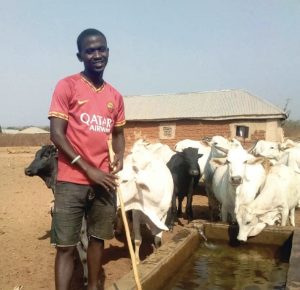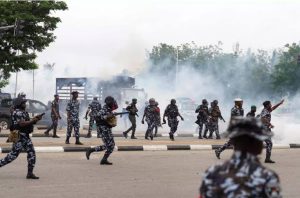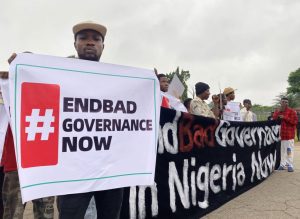
As Nigerians writhe in economic agony and hardship ravages like wildfire, cattle farmers, too, like Fatima Abdullahi, are weeping tears of despair. Fatima, 50, a resident of Dakingari in Suru local government area of Kebbi State, Northwestern Nigeria, is one of those farmers facing challenges to sustain her business.
Just a year ago, Fatima could buy a dry bunch of beans leaves locally known as “Harawa”—the lifeblood of her cattle—for a mere N300 ($0.183). But now, the price has ballooned to a staggering N1500 ($0.916). She has no choice but to cut down the cattle’s food supply, leaving her animals to starve and wither away. The weight of this crisis crushes her soul, as she watches her livelihood disintegrate before her eyes.
Fatima told The Liberalist that the animals no longer feed like they used to, and many of them begin to develop all sorts of illnesses because she could not afford the current price of their food. Since she could not properly tend to the animals, her cattle business was on the brink of collapse.
Nigeria’s unfriendly economic crisis is pushing cattle herders outside to look for grassland, Attairu Mubarak, a cattle farmer in Minna, the Niger state capital in the north-central part of the country, testifies. Attairu said a bag of beans shaft, one of the food items consumed by cattle, used to be sold at N4,000 ($2.44). Now, it is between N14,000 ($8,544.80) to N15,000 ($9.16).
As inflation soars, herders have an alternative: grazing their cattle outside on a plain field. However, the situation with the farmer and herder crisis is discouraging Attahiru from adopting the alternative, especially during the rainy season when farmers plant on all the land.

“So since areas are not reserved for grazing and to avoid cows trespassing into people’s farms, cows have to migrate to avoid destruction of farms,” Attairu explained. “And when migrating, herders are exposed to cattle rustlers since they might not be familiar with the environment they are migrating to.”
Open grazing remains the predominant practice of cattle rearing in Nigeria. It is a practice of nomadic herders grazing their cattle and other animals on unoccupied grassland. However, the system has birthed serious conflict between herders and farmers in the country, recording lethal violence with over 60,000 deaths since 2001.
Nigeria’s High Cost of Living
Recent data by the National Bureau of Statistics (NBS) reveals the Nigeria’s food inflation rate stands at an alarming 40.1 percent, far exceeding the general inflation rate of 33 percent. This is explicit in the increasing prices of essential food items. For instance, the price of beans per kg rose by 125 percent on a year-on-year basis, from N615 ($0.37) to N1387 (0.79) in April this year. On a month-on-month basis, the price of brown beans per kg increased by 12 percent from N1,243 ($0.76) recorded in March to N1,387 ($0.79) in April.
NBS said the north-central and south-south regions recorded the highest average price of brown beans at N1,594.84 ($0.97) and N1,579.64 ($1.04) respectively. The north-west recorded the lowest price of 1kg of brown beans at N966.9 ($0.61). In another case, the average price of a yam tuber rose by 154 percent on a year-on-year basis from the N444 ($0.25) recorded in April 2023 to N1,130.37 ($0.67) in April this year.
The effect of over-aching inflation on cattle rearers in Nigeria is not limited to what the animals consume. To maintain her cattle, Aisha Usman, a 40-year-old herder, said she normally invites a veterinary doctor to tend to her animals. And recently, the price of each injection has doubled, sometimes causing her to neglect her cattle’s health concerns.
“The high cost of living has sincerely affected everything—the cost of treating the cattle and vaccination has also increased. This makes the cost of running a cattle business high since you can’t do without treatment,” Attairu lamented.
The rising inflation, resulting in the high cost of living and economic hardship, triggered the ten-day nationwide #EndBadGovernance protest early this month; coupled with that is the government’s reckless spending, protesters told The Liberalist. To cushion the impacts of the inflated food prices, the Nigerian government approved a 150-day duty-free importation of major food items like rice, beans and wheat.






